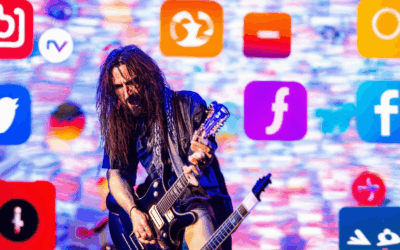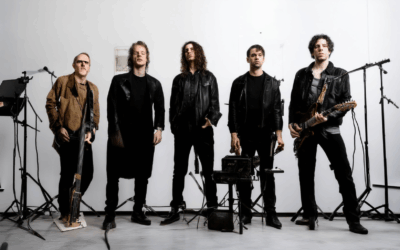Starting a music career comes with its fair share of challenges, from securing funding to building a loyal fanbase. For many musicians, traditional paths to success can feel elusive, leaving them searching for innovative ways to achieve their goals. One powerful tool that has emerged in recent years is crowdfunding for musicians—a method that not only helps artists fund their projects but also connects them directly with their audience. Whether you’re an aspiring artist looking to launch your debut project or a seasoned performer seeking new opportunities, crowdfunding offers a unique avenue to ignite your music career. In this article, we’ll explore how musicians can leverage crowdfunding to overcome financial obstacles, connect with fans, and build thriving careers in the music industry. From understanding the best platforms to employing effective strategies, we’ll delve into the ins and outs of successful crowdfunding campaigns, providing you with actionable insights to propel your musical journey forward. Let’s dive in and discover how you can harness the power of crowdfunding to turn your passion for music into a fulfilling profession.
Key Takeaways
- Leverage grants and sponsorships by applying to reputable organizations like the National Endowment for the Arts (NEA) and the American Society of Composers, Authors, and Publishers (ASCAP), and seek partnerships with local businesses.
- Utilize crowdfunding platforms such as Kickstarter and Patreon to connect with fans, set goals, and offer exclusive rewards.
- Secure loans for musical projects by researching banks offering musician-specific loans and understanding terms like APR.
- Collaborate with brands to gain sponsorships and partnerships, enhancing visibility and financial support.
- Diversify income streams through live performances, merchandise sales, and streaming platforms for sustained revenue.
- Build a robust network by collaborating with fellow musicians, producers, and brands to access resources and opportunities.
- Explore teaching and workshops to earn additional income and engage with the community while promoting your music.

How to Crowdfund as a Musician
Crowdfunding is an effective way for musicians to raise funds for various projects, such as recording albums, producing videos, or touring. Here’s a step-by-step guide to help you get started:
- Select a Crowdfunding Platform: Choose a platform that aligns with your needs. Popular options include Kickstarter , Indiegogo , and Patreon . Each platform has unique features, so research them thoroughly.
- Set Your Goal: Determine the amount of money you need to raise and set a realistic deadline. Platforms typically take a percentage of your funds, so factor in these fees when calculating your target amount.
- Create a Compelling Pitch: Craft a story that connects emotionally with potential donors. Include details about your musical journey, the project’s significance, and what supporters will receive in return. Add visuals like videos or audio clips to enhance your pitch.
- Market Your Campaign: Promote your campaign through social media channels, email newsletters, and collaborations with music influencers. Prepare promotional materials in advance to maximize your outreach efforts.
- Engage with Donors: Respond promptly to contributions and keep your supporters updated. Share progress updates and be transparent about any challenges you face. This builds trust and encourages continued support.
- Fulfill Rewards Post-Campaign: After reaching your goal, distribute the promised rewards. Maintain communication with donors to ensure they feel valued and satisfied with their contribution.
- Handle Legal and Financial Considerations: Verify that all copyright and licensing rights are secure. Consult with a tax professional to address any financial obligations tied to your campaign.
By following these steps, you can effectively leverage crowdfunding to support your musical aspirations and connect with fans who believe in your vision.
The Best Crowdfunding Platform for Music
When it comes to choosing the best crowdfunding platform for musicians, several options stand out due to their unique features and strengths. Here’s a breakdown of the top platforms to consider:
- Kickstarter : Known as the gold standard in crowdfunding, Kickstarter is ideal for musicians looking to raise funds for projects like albums, tours, or music videos. Its large, engaged audience and robust platform make it a top choice. Visit Kickstarter
- Indiegogo : Another popular platform, Indiegogo often offers better funding rates and fewer restrictions compared to Kickstarter. It’s a good alternative for musicians seeking flexibility. Visit Indiegogo
- PledgeMusic : Specializing in music projects, PledgeMusic allows fans to contribute in exchange for exclusive rewards like song downloads, autographed CDs, or even private concerts. This deeper engagement can boost campaign success. Visit PledgeMusic
- FundedByMe : Known for its user-friendly interface and competitive rates, FundedByMe is a solid choice for musicians looking for a simple yet effective platform. Visit FundedByMe
Each platform has its advantages, so the best choice depends on your specific needs. Consider factors like audience reach, fee structures, success stories, ease of use, analytics, customer support, international availability, and payment processing capabilities.

What is the best crowdfunding for artists?
Crowdfunding has become a powerful tool for artists to connect with their audience and fund their projects. Below are some of the most effective platforms tailored for artists:
- Indiegogo : Known for its flexibility, Indiegogo allows artists to keep the funds raised even if they don’t meet their initial goal. This makes it ideal for experimental projects.
- ArtistShare : Specializing in music, ArtistShare is perfect for bands and musicians looking to engage a niche audience and crowdfund their albums or tours.
- Patreon : A great option for creating a sustainable income stream through recurring donations, Patreon is favorite among creators for consistent support from fans.
- RocketFuel : Focuses on helping artists with everything from crowdfunding to selling merchandise, making it a versatile choice for various artistic endeavors.
- Kickstarter : A popular platform for launching creative projects, Kickstarter has helped numerous artists fund their innovative ideas and bring them to life.
- FundedByMe : Offers micro-investing opportunities for artists, allowing them to secure small investments from backers who believe in their vision.
Why Choose These Platforms?
These platforms stand out because they cater specifically to artists, offering tools and features that support creativity and project execution. Each platform has unique benefits, so the choice depends on your project goals and audience preferences.
How to Succeed in Crowdfunding for Artists
To maximize your chances of success, create compelling content that tells your story and involves your audience. Engage with supporters through updates and rewards, and promote your campaign through social media and your network.
Remember, the key to successful crowdfunding is authenticity and passion. Share your journey, involve your community, and make meaningful connections to inspire contributions.
For more resources and tips, explore our Crowdfunding Guide and discover how to leverage these platforms effectively.

Funding Methods for Musicians
Musicians can secure funding through various channels, each offering unique benefits and requirements. Below are the primary methods:
1. Grants and Sponsorships
One of the most sought-after funding sources for musicians is grants and sponsorships. Organizations and businesses often provide financial support to musicians in exchange for promotional opportunities or project commitments.
- Apply for grants from organizations like the National Endowment for the Arts and the American Society of Composers, Authors, and Publishers .
- Seek sponsorship deals with local businesses or brands that align with your music genre or image.
- Participate in funding competitions or open calls for proposals from foundations focused on the arts.
2. Crowdfunding
Crowdfunding platforms have become a popular alternative for musicians to raise funds directly from fans and supporters. These platforms allow artists to set goals and attract contributors in exchange for rewards or exclusive content.
- Platforms like Kickstarter and Patreon enable musicians to launch campaigns and connect with their audience.
- Offer incentives such as exclusive tracks, merchandising, or behind-the-scenes access to attract donors.
3. Loans and Credit Lines
For musicians requiring immediate financial backing, loans and credit lines can be viable options. These are typically unsecured and tailored to individual needs.
- Research banks and financial institutions offering loans specifically for musical projects or equipment purchases.
- Consider secured loans if you have collateral, or unsecured loans if your credit history is strong.
- Be prepared to repay the loan with interest, usually ranging from 6% to 24% APR.
4. Investment and Venture Capital
While less common, some musicians seek investment from private investors or venture capital firms willing to invest in promising talent or projects.
- Collaborate with angel investors or venture capitalists who may be interested in your artistic vision and potential for commercial success.
- Be prepared to discuss revenue-sharing agreements or equity stakes in return for investment.
5. Performing and Selling Merchandise
Musicians can generate income through live performances and the sale of merchandise. This includes physical products like CDs, vinyl records, and t-shirts, as well as digital goods like downloads and streaming memberships.
- Perform at venues that pay stipends or provide expense coverage.
- Sell official merchandise during live shows or through online stores.
- Monetize your music via streaming platforms and digital distribution services.
6. Collaborations and Partnerships
Strategic collaborations with other artists, producers, or brands can lead to funding opportunities. These relationships often provide resources, mentorship, and financial support.
- Partner with established artists or labels for joint ventures and shared resources.
- Collaborate with brands aligned with your music to participate in marketing campaigns or promotions.
7. Teaching and Workshops
Teaching music classes, hosting workshops, or offering private lessons can provide a steady income stream while connecting with the community.
- Offer group lessons or intensive workshops on topics like songwriting, production, or performance technique.
- Advertise locally or online to attract students and participants.
By exploring these funding methods, musicians can identify the best approach for their career goals and personal circumstances. Each option comes with its own set of challenges and requirements, so it’s essential to research thoroughly before applying.
Do Musicians Struggle Financially?
Musicians often face significant financial challenges due to the nature of their work. Here are some key reasons why:
- Gig cancellations and uncertainty due to events like the COVID-19 pandemic have left many musicians without income.
- Low royalty rates from streaming platforms can leave artists with minimal earnings despite their popularity.
- High expenses for equipment, travel, and venue rentals often outweigh income from performances.
- Building a fanbase and gaining recognition takes years and requires significant investment without guaranteed returns.
However, many musicians find success through various revenue streams:
- Larger tours and concerts can generate substantial income.
- Streaming platforms and digital sales provide consistent revenue.
- Sponsorships and endorsements with brands can supplement income.
- Some musicians earn through side projects like merchandise, lessons, or YouTube ad revenue.
While financial instability is common, perseverance and innovative approaches can lead to long-term success. Musicians like Harry Styles and Billie Eilish have built lucrative careers by leveraging tours, social media, and brand partnerships.
For more insights, visit our music blog .

How to Get a Music Loan
Securing a music loan can be a great way to support your musical aspirations. Whether you’re looking to purchase instruments, equipment, or fund your next project, there are several pathways to explore. Below is a guide to help you navigate the process effectively.
- Research and Plan: Begin by assessing your financial situation and determining the exact purpose of your loan. Are you purchasing gear, recording your album, or covering travel expenses for a tour? Having a clear plan will help you secure the right type of loan and terms.
- Explore Loan Options: Consider various financing avenues such as traditional bank loans, specialized music equipment loans, or even crowd-funding campaigns. Each option has its pros and cons, so it’s essential to evaluate them based on your needs and credit history.
- Apply for a Bank Loan: Many banks offer loans specifically tailored for musicians. These loans often come with flexible repayment plans and competitive interest rates. Ensure you review the terms carefully before applying.
- Investigate Grants and Scholarships: Musicians can sometimes qualify for grants or scholarships offered by organizations that support the arts. These programs may provide financial assistance without the burden of repaying loans.
- Crowdfunding Campaigns: Platforms like Kickstarter allow artists to raise funds directly from fans. While this isn’t a traditional loan, it can be a powerful tool for generating income and building a community around your music.
- Collaborate with Brands or Venues: Partnering with companies that sponsor musicians or venues can open doors to sponsorship opportunities. This might involve exchanging promotional visibility for financial support.
When exploring these options, consider reaching out to trusted networks, music communities, or professional organizations for recommendations. Additionally, verify the credibility and reputation of any lender or platform you’re working with to ensure a smooth experience.
Remember, securing a music loan requires careful planning and research. By evaluating your options and aligning your financial goals with the right solution, you can advance your musical journey with confidence.



0 Comments